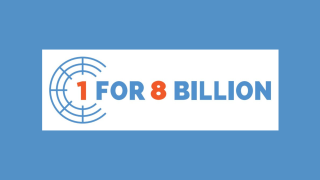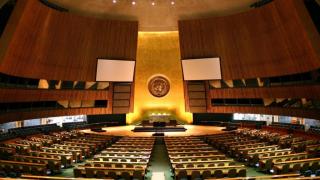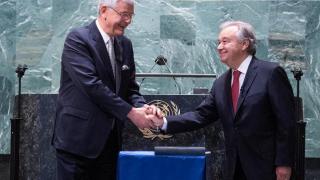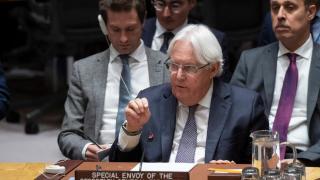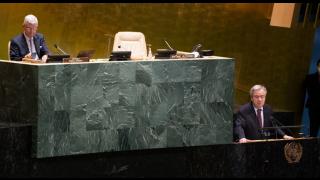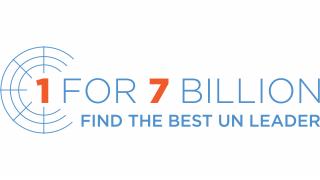
Under the banner of the 1 for 7 Billion campaign, UNA-UK has released a statement on the circumstances surrounding the appointment of the next UN humanitarian chief:
The controversy[1] surrounding the choice of a successor to Valerie Amos reinforces the principles of the 1 for 7 Billion campaign, which hold that merit, not nationality, should be the deciding factor when appointing senior UN officials.
Ms Amos, a British citizen, announced last week that she is stepping down as UN humanitarian chief. The UK is said to have put forward just a single candidate to replace her, despite UN requests for further nominations.[2]
On paper, responsibility for such appointments lies with the Secretary-General. The UN has sought to put in place a “rigorous, open process against predetermined criteria” for senior UN roles.[3] Secretary-General Ban Ki-moon has said he wants “inclusive and well-considered shortlist[s]” of qualified candidates, including at least one woman.[4]
In practice, however, it is powerful states that call the shots. “Wheeling and dealing” over top positions is commonplace. It has become an unfortunate feature of the Secretary-General’s own appointment, with the veto-carrying members of the Security Council staking claims to specific posts in exchange for supporting candidates.
As a result, the UK has “held” the humanitarian post since 2007. The past four heads of UN peacekeeping have been French. The USA, Russia and China have also insisted on high-level positions for their citizens. While these countries have produced some excellent postholders, others have not been highly qualified. Appointments should be made through formal selection criteria and a process that is transparent to the wider UN membership and public. They should not be the result of promises or pressure.
The post of Under-Secretary-General for Humanitarian Affairs has been described as “one of the most difficult, important jobs in the world”.[5] He or she leads the body charged with coordinating emergency assistance to people caught up in disasters and conflicts across the world.
Mr Ban should be able to choose the most competent person for this crucial role. Millions of lives will be affected by this decision, from Ebola victims to Syrian refugees.
The Steering Committee of the 1 for 7 Billion campaign urges all UN member states and the media to support him in insisting on a choice of qualified candidates, selected through a transparent, fair and merit-based process.
The situation also highlights the urgent need to move forward with improving the process for selecting the next Secretary-General. This must include clear statements from the General Assembly and Security Council on ending the practice of seeking promises on senior appointments from candidates.
Click here to read about 1 for 7 Billion’s campaign to improve how the Secretary-General is elected
[1] Somini Sengupta, “Resignation of Top UN Relief Official Sets Up Clash”, New York Times, 26 November 2014: http://www.nytimes.com/2014/11/27/world/valerie-amos-top-un-relief-official-to-step-down.html?_r=0
[2] “Would you give Andrew Lansley the UN’s top humanitarian job?” Channel 4 News, http://www.channel4.com/news/andrew-lansley-united-nations-humanitarian-...
[3] Measures to strengthen accountability at the United Nations, Report of the Secretary-General to the General Assembly, 30 August 2005 (A/60/312), para 53, and ‘Transparency in the Selection and Appointment of Senior Managers in the UN Secretariat’, Joint Inspection Unit (JIU/REP/2011/2), Section B
[4] Towards an accountability system in the United Nations Secretariat, Report of the Secretary-General to the General Assembly, 29 January 2010 (A/64/640), para 4. See also para 43 which sets out the appointment process as envisaged by the Secretary-General.
[5] Former UN Deputy Secretary-General Mark Malloch Brown, interviewed by Lindsey Hilsum, Channel 4 News, on 26 November 2014: http://blogs.channel4.com/lindsey-hilsum-on-international-affairs/role-camerons-mate-lansley-appalling/4727

